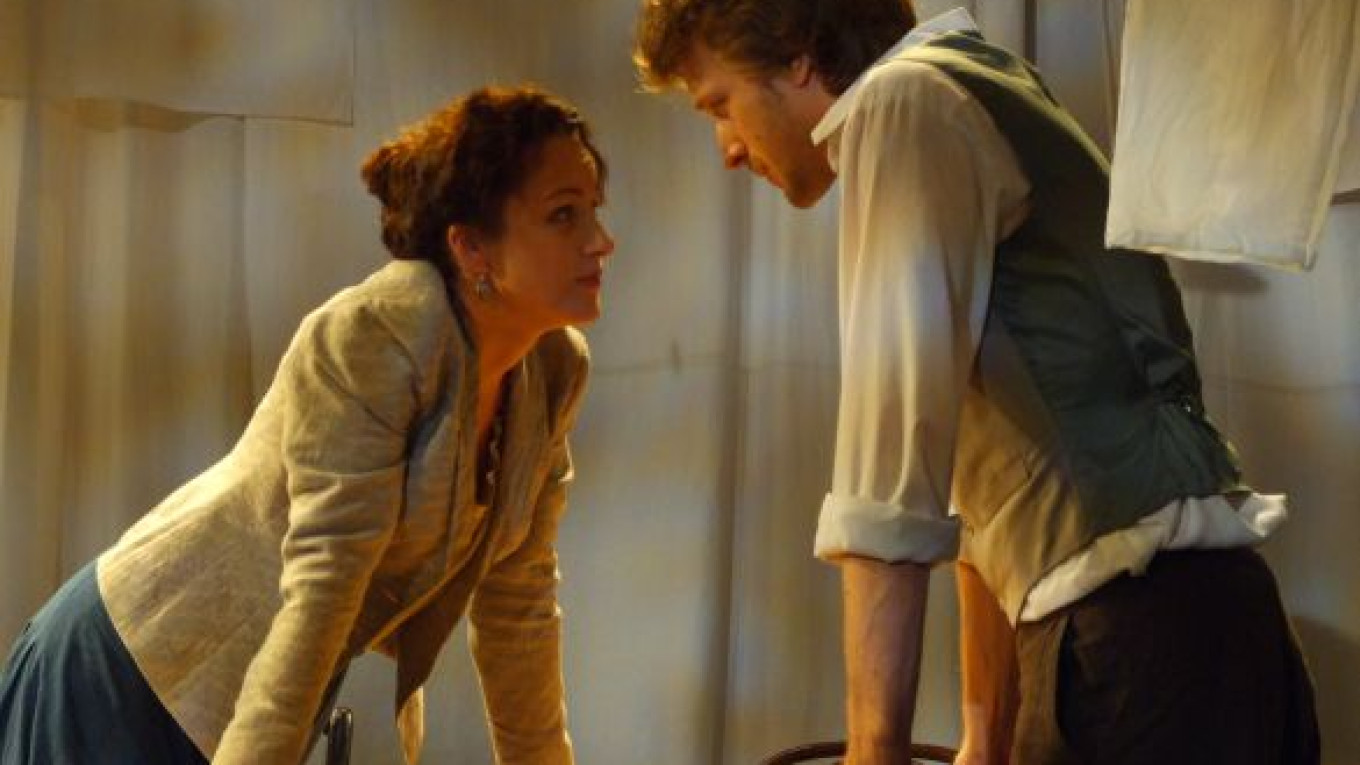Yelena Gremina has nurtured a relationship with Anton Chekhov for years. In one of her most popular plays, “The Sakhalin Wife,” she explored the lives of several convicts in Siberia in the months, days, hours and minutes before the writer Anton Chekhov arrived to do research on that famous Russian penal colony.
At that time, in the mid-1990s, it was a clever bit of good-natured revenge to end her tale at the very moment when the writer supposedly arrived in the next room. Gremina understandably felt that she and her contemporary dramatist colleagues had been unfairly overshadowed by Chekhov’s enormous legacy. In those days there were usually 30 to 40 Chekhov productions running at any given time in Moscow, while if there were 15 new plays produced by living writers it was considered a good year.
Things have changed, however, and largely because of the efforts of Gremina. As a co-founder of the influential Teatr.doc and a longtime organizer of the Lyubimovka play-writing festival, she has been one of the moving forces in bringing to light new writing for the theater.
Her latest play, her first in several years, brings her back to Chekhov.
“The Brothers Ch.,” directed by Alexander Galibin at the Stanislavsky Drama Theater and co-produced by the Chekhov International Theater Festival, is an exploration of a Chekhov that most of us know little about. This is the period when he is not yet the “great writer,” but is successful enough as an author of humorous sketches to support his entire family.
And what a family it is!
Gremina focuses on the three eldest Chekhov brothers, Alexander, Nikolai and Anton. All were talented and all were strong individuals, but only the latter had the — what? — the discipline? the drive? the ability to stay above the fray of life’s battles that is necessary to be a writer?
Alexander in “The Brothers Ch.” repeatedly complains to anyone who will listen that only he lives a real life. The implication is that Anton doesn’t.
It is true that in some ways Anton Chekhov avoided hard decisions. His relationships with women, expressed here in failed romances with Natalya Golden and Yevdokia Efros, were marked by his penchant for backing away whenever commitment raised its threatening head.
On the other hand, Anton was the only member of his family who rose above the crippling obsessions that destroyed his older brothers. Both succumbed to alcoholism, waywardness and exacerbated hubris.
Anton famously “squeezed the slave” out of his blood, achieving something that no one else in his immediate family could.
Behind the brothers stood a rather mysterious father, Yegor, a man who was an indentured serf until the age of 16, who was able to give all his sons higher education, but who himself was limited in intellect and understanding. A tyrant when his boys were young, he more often resembled a semi-harmless buffoon by the time they grew up.
Building dialogue based on actual letters and Chekhov’s literary works, Gremina paints a picture of a writer emerging from the familial chaos that surrounds him. In various phrases tossed off in anger or wonder we recognize lines that will reappear as titles of Chekhov’s stories and plays — “Gooseberries,” “Anna on the Neck,” “The Seagull.”
Anticipating key events in “The Seagull” and “Uncle Vanya,” Alexander shoots at a seagull flying overhead, and he twice fires a gun at Anton, although the pistol misfires.
“The Brothers Ch.” is not intended as reliable biography, but it is an often touching, insightful and, one suspects, trustworthy psychological portrait — of talent being realized and talent being squandered.
In Galibin’s hands the story is told with sensitivity and understatement.
Stanislav Ryadinsky is quietly convincing as the thoughtful, somewhat distant and usually ironic Anton. His one or two outbursts of anger set him apart from Alexander (Vsevolod Boldin) and Nikolai (Anton Syomkin) for their rarity.
Yelizaveta Dzutseva created the simple set dominated by white sheets hanging across the length of the stage. On one hand they look like common laundry, but on a deeper level, they suggest the layers of similar, but different, personalities that make up the troubled though richly nuanced Chekhov family.
I can imagine this play being staged quite differently, with less sentiment and more severity. As it is, “The Brothers Ch.” provides an intriguing look at a writer who is impossible to pin down: Did he become a writer because, or in spite, of his splendidly dysfunctional family?
“The Brothers Ch.” (Bratya Ch.) plays Tues. and Wed. at 7:30 p.m. at the Stanislavsky Drama Theater, located at 23 Tverskaya Ulitsa. Metro Pushkinskaya. Tel. 699-7224, www.teatr-stanislavsky.ru. Running time: 1 hour, 45 minutes.
A Message from The Moscow Times:
Dear readers,
We are facing unprecedented challenges. Russia's Prosecutor General's Office has designated The Moscow Times as an "undesirable" organization, criminalizing our work and putting our staff at risk of prosecution. This follows our earlier unjust labeling as a "foreign agent."
These actions are direct attempts to silence independent journalism in Russia. The authorities claim our work "discredits the decisions of the Russian leadership." We see things differently: we strive to provide accurate, unbiased reporting on Russia.
We, the journalists of The Moscow Times, refuse to be silenced. But to continue our work, we need your help.
Your support, no matter how small, makes a world of difference. If you can, please support us monthly starting from just $2. It's quick to set up, and every contribution makes a significant impact.
By supporting The Moscow Times, you're defending open, independent journalism in the face of repression. Thank you for standing with us.
Remind me later.


